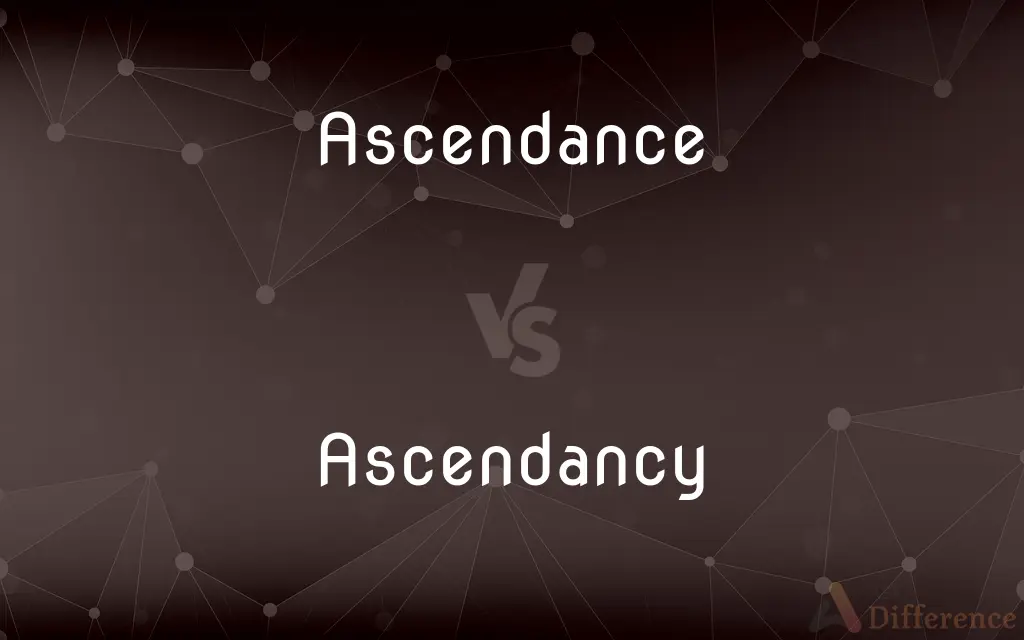Ascendance vs. Ascendancy — What's the Difference?
By Tayyaba Rehman & Fiza Rafique — Updated on May 7, 2024
Ascendance and ascendancy both refer to a rise in position or power, but ascendancy often implies a more dominant, controlling influence.

Difference Between Ascendance and Ascendancy
Table of Contents
ADVERTISEMENT
Key Differences
Ascendance refers to the process or state of rising to a higher level, particularly in power, influence, or importance. Whereas ascendancy not only involves rising, but also emphasizes a state of dominance or prevailing control over others. This distinction highlights how ascendancy carries a stronger connotation of control than ascendance.
In various contexts, ascendance can be used more broadly to signify any type of upward movement or improvement. On the other hand, ascendancy is frequently utilized in political or strategic scenarios where one party gains a superior position over another. This use underlines the competitive or hierarchical nature inherent in the concept of ascendancy.
When discussing personal achievements, individuals might describe their career progress or spiritual growth as ascendance, suggesting a journey towards a higher state. Whereas in discussing political parties or leaders, one might use ascendancy to describe their position of control or influence over others, emphasizing the aspect of power dynamics.
The term ascendance is often used in a more neutral or positive light, focusing on the process of rising. In contrast, ascendancy might carry a slightly more aggressive or strategic implication, focusing on the outcome of gaining power and control.
In literature, ascendance might describe a character's rise in terms of moral or personal development. Ascendancy, however, could be used to depict a character’s journey to a position of power or influence over others, often at the expense of rivals.
ADVERTISEMENT
Comparison Chart
Connotation
Neutral, positive; implies upward movement
Often strategic, implies control and power
Common Usage
Personal and general growth
Political or strategic dominance
Focus
Process of rising
Outcome of gaining superiority
Literary Example
Character’s moral development
Character's rise to power over others
Preferred Contexts
Personal achievements, spiritual growth
Political scenarios, competitive settings
Compare with Definitions
Ascendance
The act of moving upward.
The company's rapid ascendance in the tech industry was impressive.
Ascendancy
The state of being the most powerful.
The empire was at the height of its ascendancy.
Ascendance
Rising to a higher position.
His ascendance to the executive role was unexpected.
Ascendancy
Superiority or governing power.
The general's military ascendancy was crucial during the war.
Ascendance
A state of being ascendant.
In the debate, her ascendance was clear from the start.
Ascendancy
Prevailing influence or authority.
Her intellectual ascendancy was acknowledged by her peers.
Ascendance
Gaining prominence or importance.
Social media's ascendance has reshaped communication.
Ascendancy
Occupying a position of power.
The party held ascendancy in the urban areas.
Ascendance
Advancement in status.
His ideas gained ascendance within the academic community.
Ascendancy
Dominance over others.
His ascendancy in the boardroom was undisputed.
Ascendance
Ascendancy.
Ascendancy
Superiority or decisive advantage; domination
"Germany only awaits trade revival to gain an immense mercantile ascendancy" (Winston S. Churchill).
Ascendance
Ascendancy, superiority; the act of ascending.
Ascendancy
Supremacy; dominant control; the quality of being in the ascendant.
Ascendance
The state that exists when one person or group has power over another;
Her apparent dominance of her husband was really her attempt to make him pay attention to her
Ascendancy
A class of Protestant landowners and professionals that dominated political and social life in Ireland up to the early 20th century
Ascendancy
(ecology) A quantitative attribute of an ecosystem, defined as a function of the ecosystem's trophic network, and intended to indicate its ability to prevail against disturbance by virtue of its combined organization and size.
Ascendancy
Same as Ascendency.
Ascendancy
The state that exists when one person or group has power over another;
Her apparent dominance of her husband was really her attempt to make him pay attention to her
Common Curiosities
What is ascendancy?
Ascendancy denotes a state or position of dominance, power, or influence over others.
Which term is more suitable for describing a political leader’s power?
Ascendancy is more suitable for describing a political leader's power, especially when emphasizing dominance.
How do ascendance and ascendancy differ in usage?
Ascendance is often used in contexts of personal or neutral growth, while ascendancy is used in contexts implying control and power.
What type of scenarios is ascendancy most associated with?
Ascendancy is frequently associated with political, strategic, or competitive scenarios.
Is ascendance used more in personal or public contexts?
Ascendance is commonly used in personal contexts, such as discussing career progress or spiritual growth.
What is ascendance?
Ascendance refers to the act or process of rising to a higher level or position.
Can ascendance and ascendancy be used interchangeably?
While they can be used interchangeably in some contexts, ascendancy often carries connotations of dominance not always present in ascendance.
What does it mean when a company is in ascendance?
It means the company is rising in power, influence, or market share.
How does the connotation of ascendance differ from ascendancy?
Ascendance has a more neutral or positive connotation, focusing on upward movement; ascendancy implies a more aggressive or dominant control.
How might a historian use the term ascendancy?
A historian might use ascendancy to describe a period when a particular nation or leader held dominant power.
Share Your Discovery

Previous Comparison
Supreme vs. Ultimate
Next Comparison
Causeway vs. JettyAuthor Spotlight
Written by
Tayyaba RehmanTayyaba Rehman is a distinguished writer, currently serving as a primary contributor to askdifference.com. As a researcher in semantics and etymology, Tayyaba's passion for the complexity of languages and their distinctions has found a perfect home on the platform. Tayyaba delves into the intricacies of language, distinguishing between commonly confused words and phrases, thereby providing clarity for readers worldwide.
Co-written by
Fiza RafiqueFiza Rafique is a skilled content writer at AskDifference.com, where she meticulously refines and enhances written pieces. Drawing from her vast editorial expertise, Fiza ensures clarity, accuracy, and precision in every article. Passionate about language, she continually seeks to elevate the quality of content for readers worldwide.














































